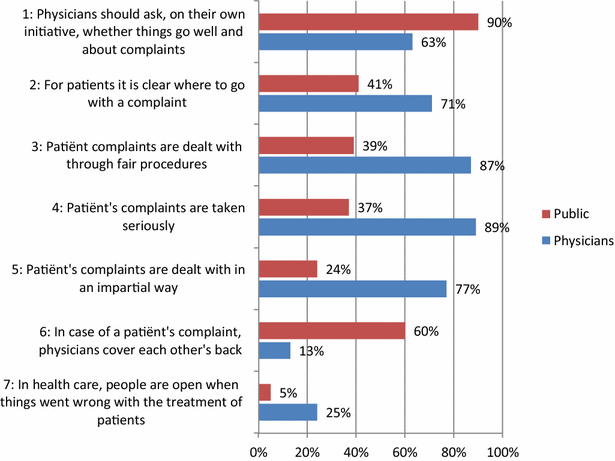Complaint handling in healthcare: expectation gaps between physicians and the public; results of a survey study
- PMID: 26429097
- PMCID: PMC4591727
- DOI: 10.1186/s13104-015-1479-z
Complaint handling in healthcare: expectation gaps between physicians and the public; results of a survey study
Abstract
Background: Patients who submit complaints about the healthcare they have received are often dissatisfied with the response to their complaints. This is usually attributed to the failure of physicians to respond adequately to what complainants want, e.g. an apology or an explanation. However, expectations of complaint handling among the public may colour how they evaluate the way their own complaint is handled. This descriptive study assesses expectations of complaint handling in healthcare among the public and physicians. Negative public expectations and the gap between these expectations and those of physicians may explain patients' dissatisfaction with complaints procedures.
Methods: We held two surveys; one among physicians, using a panel of 3366 physicians (response rate 57 %, containing all kinds of physicians like GP's, medical specialist and physicians working in a nursing home) and one among the public, using the Dutch Healthcare Consumer Panel (n = 1422, response rate 68 %). We asked both panels identical questions about their expectations of how complaints are handled in healthcare. Differences in expectation scores between the public and the physicians were tested using non-parametric tests.
Results: The public have negative expectations about how complaints are handled. Physician's expectations are far more positive, demonstrating large expectation gaps between physicians and the public.
Conclusions: The large expectation gap between the public and physicians means that when they meet because of complaint, they are likely to start off with opposite expectations of the situation. This is no favourable condition for a positive outcome of a complaints procedure. The negative public preconceptions about the way their complaint will be handled will prove hard to change during the process of complaints handling. People tend to see what they thought would happen, almost inevitably leading to a negative judgement about how their complaint was handled.
Figures
Similar articles
-
Patient expectations of fair complaint handling in hospitals: empirical data.BMC Health Serv Res. 2006 Aug 18;6:106. doi: 10.1186/1472-6963-6-106. BMC Health Serv Res. 2006. PMID: 16919165 Free PMC article.
-
Complaints handling in hospitals: an empirical study of discrepancies between patients' expectations and their experiences.BMC Health Serv Res. 2008 Sep 30;8:199. doi: 10.1186/1472-6963-8-199. BMC Health Serv Res. 2008. PMID: 18826575 Free PMC article.
-
[Dentists' judgement of the complaint procedure of the Royal Dutch Dental Association].Ned Tijdschr Tandheelkd. 2015 Feb;122(2):101-8. doi: 10.5177/ntvt.2015.02.14164. Ned Tijdschr Tandheelkd. 2015. PMID: 26193109 Dutch.
-
The measurement of patients' expectations for health care: a review and psychometric testing of a measure of patients' expectations.Health Technol Assess. 2012 Jul;16(30):i-xii, 1-509. doi: 10.3310/hta16300. Health Technol Assess. 2012. PMID: 22747798 Review.
-
[Dealing with patient dissatisfaction; a professional skill].Ned Tijdschr Geneeskd. 2002 Nov 2;146(44):2079-81. Ned Tijdschr Geneeskd. 2002. PMID: 12448961 Review. Dutch.
Cited by
-
Testing the Healthcare Complaints Analysis Tool in a Specialist Pediatric Hospital to Assess Potential Utility for Organizational Learning from Complaints.J Patient Exp. 2022 Jun 14;9:23743735221106594. doi: 10.1177/23743735221106594. eCollection 2022. J Patient Exp. 2022. PMID: 35734468 Free PMC article.
-
Analysis of the characteristics and risk factors affecting the judgment results of medical damage liability disputes in 3172 second-instance and retrial cases in China.Hum Resour Health. 2023 Jun 29;21(1):53. doi: 10.1186/s12960-023-00832-6. Hum Resour Health. 2023. PMID: 37386560 Free PMC article. Review.
-
Leveraging Patients' Creative Ideas for Innovation in Health Care.Milbank Q. 2024 Mar;102(1):233-269. doi: 10.1111/1468-0009.12682. Epub 2023 Dec 13. Milbank Q. 2024. PMID: 38090879 Free PMC article.
-
Performance of Large Language Models in Patient Complaint Resolution: Web-Based Cross-Sectional Survey.J Med Internet Res. 2024 Aug 9;26:e56413. doi: 10.2196/56413. J Med Internet Res. 2024. PMID: 39121468 Free PMC article.
-
Assessment of Patient Matters in Healthcare Facilities.Healthcare (Basel). 2024 Jan 26;12(3):325. doi: 10.3390/healthcare12030325. Healthcare (Basel). 2024. PMID: 38338210 Free PMC article.
References
-
- Merriam-webster Dictionary [http://www.merriam-webster.com/dictionary/complaint]. Accessed 29 Sept 2015.
MeSH terms
LinkOut - more resources
Full Text Sources
Other Literature Sources
Medical
Miscellaneous


